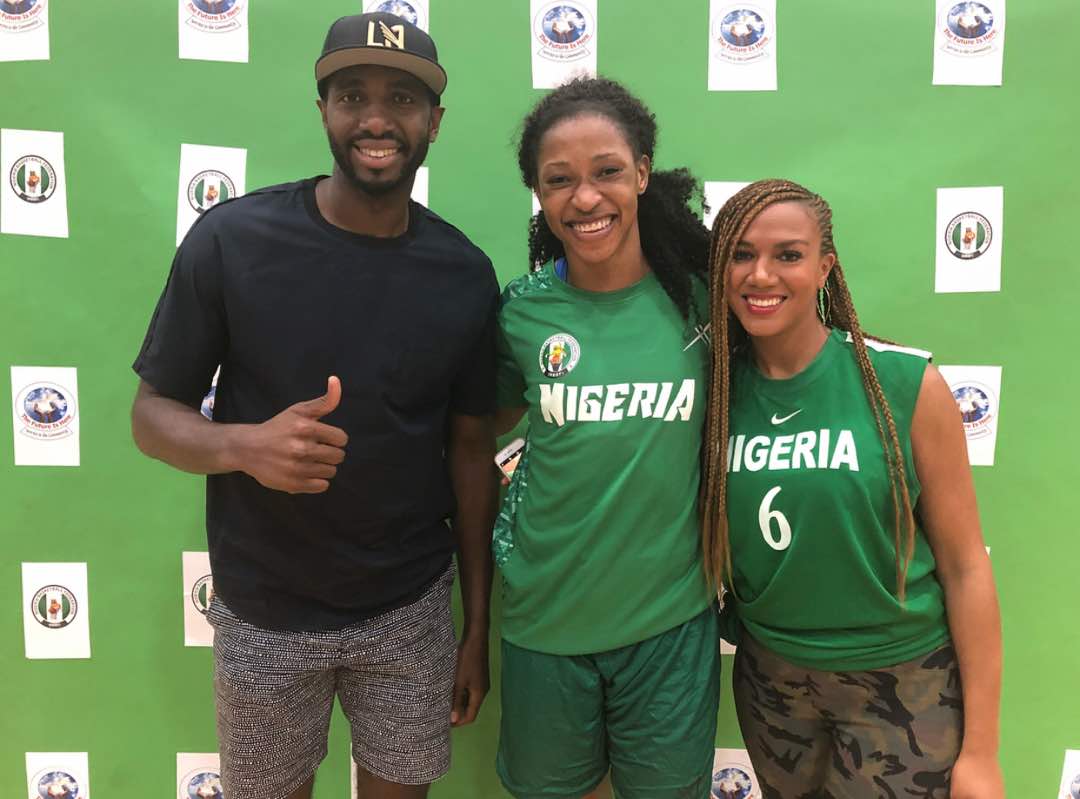NBA broadcaster Rosalyn Gold-Ogwude paid a visit to the D’Tigress camp in Atlanta on Sunday to encourage the players on a career path after basketball.
Onwude who has a Nigerian father from Edo State and an American mother of Russian descent advised the players to be good representatives of Nigeria.
“When you wear the Nigerian jersey, wear it with pride, confidence, swag and commitment to excellence. For those fighting for a jersey it comes with anxiety and pressure. I still feel that way when I am on tv it is always like game day so I have to be at my best. You have to prepare, read about the other team, understand and react on the court quickly. This is why we need good preparation to do well. Eat right, sleep right, rehab before and after practice,”she said.
“It’s so hard to get to the World Cup or qualify whether you are a big shot or under dog but it also goes to show there is a lot of work to be done.
I don’t remember the stat anymore while I was playing but I remember the food in different countries, the bus rides, dinner, jokes, this is a life achievement no one can take from you forever. You have the country on you even the continent because you are representing everyone. People will want to find a way to affiliate part of them with yours and start following you.”
A graduate of communication who started basketball at the age of 4 explained the importance of having a life after the sports via D’Tigress Facebook live.
“When I got out of school I was thinking of getting a job with Nike, should I play ball at Stanford, or play professionally which I’ll be far from home or getting a life in broadcasting which is very tough not going to make any money at the start. Some of you are still in college or just getting out. This is resume moment it will give you more credibility as a professional Hooper while for me it’s gave me a voice as a broadcaster. It also gives you sisterhood like the people I played with like Joy, Aisha, Sarah we don’t have to see everyday. I have been in the city with Joy if any of them need a place to stay they can stay at my place you now have a family forever.”
The Stanford University graduate flashed back on her time with the Nigeria national team.
“During my time, we also had a mixture of those who grew up in Nigeria and those who were brought up in America just like it is now and we were all trying to bond, the meals, bus rides, so many were trying to teach me pidgin like “how you dey”, “I dey kampe”, “I go chop well well”, she laughed
“You can meet a Nigerian today no matter where you are, you always share an African parent story like my father used to ask, what is broadcasting? Because they expect all of us to be doctors, lawyers etc he even goes and say “even a simple plantain you can’t fry” but I loved what my dad used to say 20 years ago about knowing where I am from though I found it annoying back then but right now everyone wants to know their ancestors. They even link themselves with West Africa, our songs, culture, attires like ankara. ”
The Masters degree holder in sociology described her rise to the top as challenging but eventually got her breakthrough in broadcasting.
“My family had some financial issues at some point but I had to pursue my career. It looked selfish but I kept pushing though I felt frustrated like the talent was there and I was not given the opportunity. I got creative, created my own digital show, networked and finally got that big break after working for a year for free they hired me and then I started earning a salary.
I covered the G and D league, WNBA and finally got the opportunity to report in the NBA. I got signed as a reporter for the Warriors in 2015 their first Championship. It was such a blessing to get to that stage and also covering the Olympics in Brazil. When I was still playing, we missed out on the London Olympics via FIBA Olympics Qualifiers and I swore that I’ll get to the Olympics some how either playing or not and I’m happy I did.”









